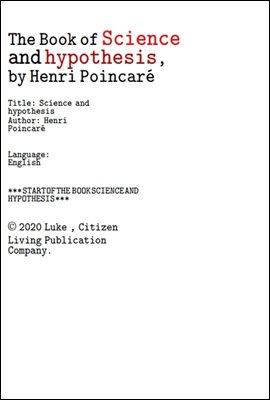
학문에서 수학및 물리등의 과학과 가설.The Book of Science and hypothesis, by Henri Poincare
- 저자편집부
- 출판사뉴가출판사
- 출판일2020-09-09
- 등록일2020-12-21
- SNS공유


- 파일포맷PDF
- 파일크기112MB
- 공급사YES24
-
지원기기
PC
PHONE
TABLET
프로그램 수동설치
전자책 프로그램 수동설치 안내
아이폰, 아이패드, 안드로이드폰, 태블릿,
보유 1, 대출 0,
예약 0, 누적대출 9, 누적예약 0
책소개
학문에서 수학및 물리등의 과학과 가설.The Book of Science and hypothesis, by Henri PoincareThe Book of Science and hypothesis, by Henri Poincar?
이책에는 수학과 미적분학 비유클리드 기하학 그리고 상대성이론및 현대 물리등의 개념이 포함되고, 그리고 학문의 가설을 세우고 이를 과학적으로 입증하는 것에 대해서 기술한 책.
AUTHOR’S PREFACE.
To the superficial observer scientific truth is unassailable, the logic of science is infallible; and if scientific men
sometimes make mistakes, it is because they have not understood the rules of the game. Mathematical truths are
derived from a few self-evident propositions, by a chain
of flawless reasonings; they are imposed not only on us,
but on Nature itself. By them the Creator is fettered,
as it were, and His choice is limited to a relatively small
number of solutions. A few experiments, therefore, will
be sufficient to enable us to determine what choice He has
made. From each experiment a number of consequences
will follow by a series of mathematical deductions, and
in this way each of them will reveal to us a corner of the
universe. This, to the minds of most people, and to students who are getting their first ideas of physics, is the
origin of certainty in science. This is what they take to be
the r?le of experiment and mathematics. And thus, too,
it was understood a hundred years ago by many men of
science who dreamed of constructing the world with the
aid of the smallest possible amount of material borrowed
from experiment.
목차
학문에서 수학및 물리등의 과학과 가설.The Book of Science and hypothesis, by Henri PoincareCONTENTS.
PAGE
Translator’s Note. . . . . . . . . . . . . . . . . . . . . . . . . . . . . . . . . . v
Introduction.. . . . . . . . . . . . . . . . . . . . . . . . . . . . . . . . . . . . . . . . vi
Author’s Preface. . . . . . . . . . . . . . . . . . . . . . . . . . . . . . . . . . . . xvi
PART I.
NUMBER AND MAGNITUDE.
CHAPTER I.
On the Nature of Mathematical Reasoning. . . . . 1
CHAPTER II.
Mathematical Magnitude and Experiment. . . . . . . 22
PART II.
SPACE.
CHAPTER III.
Non-Euclidean Geometries.. . . . . . . . . . . . . . . . . . . . . . . . 42
CHAPTER IV.
PAGE
Space and Geometry. . . . . . . . . . . . . . . . . . . . . . . . . . . . . . . . 60
CHAPTER V.
Experiment and Geometry. . . . . . . . . . . . . . . . . . . . . . . . . 83
PART III.
FORCE.
CHAPTER VI.
The Classical Mechanics. . . . . . . . . . . . . . . . . . . . . . . . . . . 101
CHAPTER VII.
Relative and Absolute Motion.. . . . . . . . . . . . . . . . . . . 125
CHAPTER VIII.
Energy and Thermo-dynamics. . . . . . . . . . . . . . . . . . . . . 138
PART IV.
NATURE.
CHAPTER IX.
PAGE
Hypotheses in Physics. . . . . . . . . . . . . . . . . . . . . . . . . . . . . . 156
CHAPTER X.
The Theories of Modern Physics.. . . . . . . . . . . . . . . . .178
CHAPTER XI.
The Calculus of Probabilities. . . . . . . . . . . . . . . . . . . . 204
CHAPTER XII.
Optics And Electricity.. . . . . . . . . . . . . . . . . . . . . . . . . . . .235
CHAPTER XIII.
Electro-Dynamics. . . . . . . . . . . . . . . . . . . . . . . . . . . . . . . . . . . 251

















